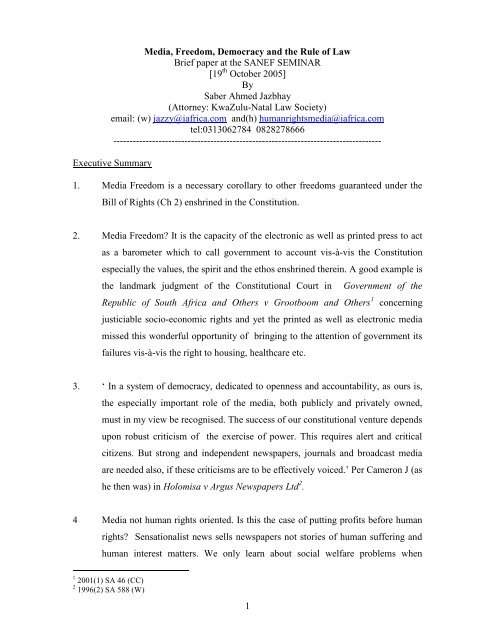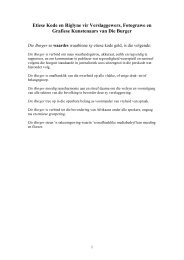Saber Ahmed Jazbhay. (84.29 KB) Media, Freedom ... - Sanef
Saber Ahmed Jazbhay. (84.29 KB) Media, Freedom ... - Sanef
Saber Ahmed Jazbhay. (84.29 KB) Media, Freedom ... - Sanef
Create successful ePaper yourself
Turn your PDF publications into a flip-book with our unique Google optimized e-Paper software.
<strong>Media</strong>, <strong>Freedom</strong>, Democracy and the Rule of Law<br />
Brief paper at the SANEF SEMINAR<br />
[19 th October 2005]<br />
By<br />
<strong>Saber</strong> <strong>Ahmed</strong> <strong>Jazbhay</strong><br />
(Attorney: KwaZulu-Natal Law Society)<br />
email: (w) jazzy@iafrica.com and(h) humanrightsmedia@iafrica.com<br />
tel:0313062784 0828278666<br />
-----------------------------------------------------------------------------------<br />
Executive Summary<br />
1. <strong>Media</strong> <strong>Freedom</strong> is a necessary corollary to other freedoms guaranteed under the<br />
Bill of Rights (Ch 2) enshrined in the Constitution.<br />
2. <strong>Media</strong> <strong>Freedom</strong>? It is the capacity of the electronic as well as printed press to act<br />
as a barometer which to call government to account vis-à-vis the Constitution<br />
especially the values, the spirit and the ethos enshrined therein. A good example is<br />
the landmark judgment of the Constitutional Court in Government of the<br />
Republic of South Africa and Others v Grootboom and Others 1 concerning<br />
justiciable socio-economic rights and yet the printed as well as electronic media<br />
missed this wonderful opportunity of bringing to the attention of government its<br />
failures vis-à-vis the right to housing, healthcare etc.<br />
3. ‘ In a system of democracy, dedicated to openness and accountability, as ours is,<br />
the especially important role of the media, both publicly and privately owned,<br />
must in my view be recognised. The success of our constitutional venture depends<br />
upon robust criticism of the exercise of power. This requires alert and critical<br />
citizens. But strong and independent newspapers, journals and broadcast media<br />
are needed also, if these criticisms are to be effectively voiced.’ Per Cameron J (as<br />
he then was) in Holomisa v Argus Newspapers Ltd 2 .<br />
4 <strong>Media</strong> not human rights oriented. Is this the case of putting profits before human<br />
rights? Sensationalist news sells newspapers not stories of human suffering and<br />
human interest matters. We only learn about social welfare problems when<br />
1 2001(1) SA 46 (CC)<br />
2 1996(2) SA 588 (W)<br />
1
someone takes the government to court for delays in pension payments. And yet<br />
these are live matters affecting the lives of ordinary people.<br />
5. Journalists need to be acclimatized to the underpinning values of the Constitution<br />
Introduction<br />
and they need to be assertive of the rights that need to be protected lest they stand<br />
in the same light as those journalists did during the apartheid era.<br />
A necessary concomitant of freedom of expression is the freedom of the press and<br />
therefore in our nascent constitutional democracy, there has to be more than paying lip<br />
service towards achieving the goals as envisioned in the Constitution. Today is the 25 th<br />
anniversary of the day when the Nationalist Party government shut down the newspaper<br />
that went by the name of THE WORLD and other voices. Looking back those twenty five<br />
years, fifteen years were occupied by censorship and media servility especially during the<br />
regime under John Vorster and PW Botha when the media was cowed to tow the official<br />
line. If you care to study some of the newsprint of the day you would hardly find<br />
publication of what was happening, for instance, a few kilometers away from our own<br />
homes in the townships. Today, we are indebted that section 15 of the Constitution<br />
ensures that we be brought up to speed with the state of the nation and what government<br />
is doing vis-à-vis our rights. If we had a servile media, the Jacob Zuma saga would have<br />
been kept under wraps and almost daily we are being informed of happenings around the<br />
country.<br />
Eleven years into our democracy, or twenty five years after the banning of newspapers, it<br />
is critical that we should assess the role that the media has to play because the journey to<br />
the summit of genuine freedom of expression is tortuous and steep. Thank you for<br />
affording this brief while to share with you some of the issues that concern me regarding<br />
shortcomings on the part of the media.<br />
Asserting the right of freedom of expression<br />
Following the 1976 Soweto uprising, it required staunch and determined reporters to<br />
expose and confront the real issues facing contemporary South Africa. Today very little<br />
2
has changed. When are they now? Why have they not bequeathed their resilience to the<br />
next generation journos equally determined to call government to account. The struggle<br />
continues though the players have changed and the gun has succumbed to the pen and yet<br />
the media conducts itself, at most of times, as if it were a waiter in the banquet of life.<br />
At the annual general meeting of SANEF, members adopted the slogan ‘Why <strong>Media</strong><br />
<strong>Freedom</strong> Matters’ as their key theme. Let’s hope that we witness something more than<br />
slogans in the form of activism on the part of editors and their charges calling to account<br />
those that we have elected into parliament as our representatives.<br />
Are Journalists rights savvy ?<br />
I do not have a clear answer on the issue. What I do know is based on evidence as I see it<br />
in the media world. Issues such as human dignity, equality, tolerance and inclusiveness<br />
do not appear to part of the training and culture as exemplified by reporters of newspaper<br />
houses across the board. My conclusions are that they need to be educated about the<br />
values, the ethos and the spirit enshrined in the Constitution. Let me case a point for the<br />
record that is highly pertinent here. In 2003 at a conference, it was felt that many African<br />
journalists were ignorant of the issues that confronted Africa and that this was reflected in<br />
their writing and reporting. Today, turn the pages of any newspaper and the conclusion is<br />
no different.<br />
<strong>Media</strong> <strong>Freedom</strong> v the Constitution<br />
Why is it that we first come to know about pensioners not being paid their pensions and<br />
about delays? Why have we not heard about human interest matters such as lack of access<br />
to health care at public hospitals? Why don’t the news media tell us about the hosuing<br />
shortage and the backlog. We learn about corruption when high profile matters such as<br />
the Schabir Shaik and the forthcoming Jacob Zuma trial. When those cases are done with<br />
we hear no more about the issue of graft and corruption.<br />
<strong>Media</strong> freedom is important to democracy for, after all, at the centre piece of the<br />
Constitution are the foundational values of human dignity, equality and freedom. Prior to<br />
1994 we had a government compliant media that became the hand-maiden of the<br />
dominant party and in the lexicon of Chomsky et al, was responsible for ‘manufacturing<br />
consent’.<br />
3
How free is the media as Lizette Rabe 3 asks ? How free is it from corporate and political<br />
interference? I am reminded of the gag order obtained against the Mail and Guardian in<br />
the OILGATE expose’.<br />
Who drives the agenda for newspapers? Who decides what’s worthy of publication as<br />
‘news’ and what is not. As someone once put it, we have plenty of news published in the<br />
newspapers but very little information that makes us critical thinkers. Is this symptomatic<br />
of George Orwell’s 1984?<br />
How free can the media be when its information dissemination role is subject to the<br />
business plan of its investors? The deadline should dictate the bottom line not profit!<br />
Summary<br />
1. <strong>Freedom</strong> comes with responsibility and obligation within the scope and ambit of<br />
the Constitution and the values, ethos and the spirit enshrined in Chapter 2,<br />
namely the Bill of Rights.<br />
2. You are never free when someone independent of you pulls the strings<br />
3. Our journalists need to become rights savvy and what is the vision and the<br />
blueprint underpinning the Constitution. Much of their writing and reporting<br />
reflects an absence of knowledge about the values that the Constitution seeks to<br />
prescribe.<br />
4. Rights not profits ought to be the bottom line. Presently it is the other way around.<br />
<strong>Saber</strong> <strong>Ahmed</strong> <strong>Jazbhay</strong><br />
humanrightsmedia@iafrica.com<br />
0828278666<br />
3 ‘Why <strong>Media</strong> <strong>Freedom</strong> matters’ in http://www.news24.com dated 13.10.2005<br />
4



